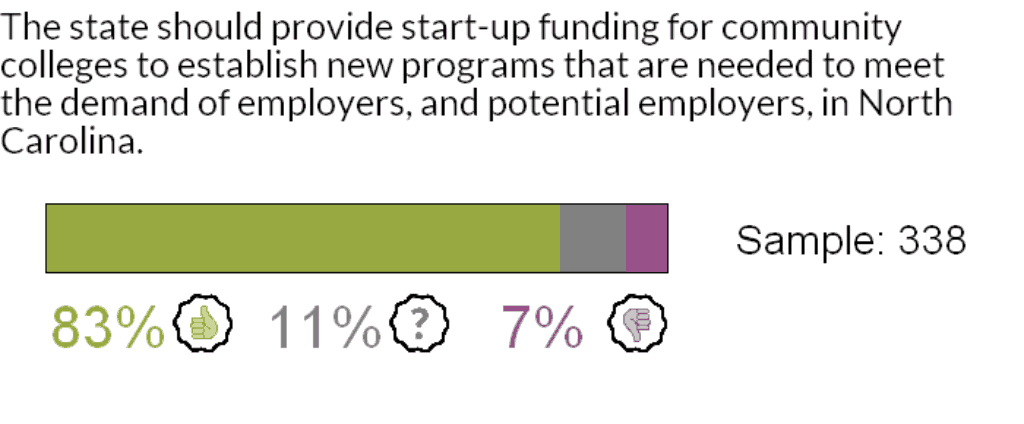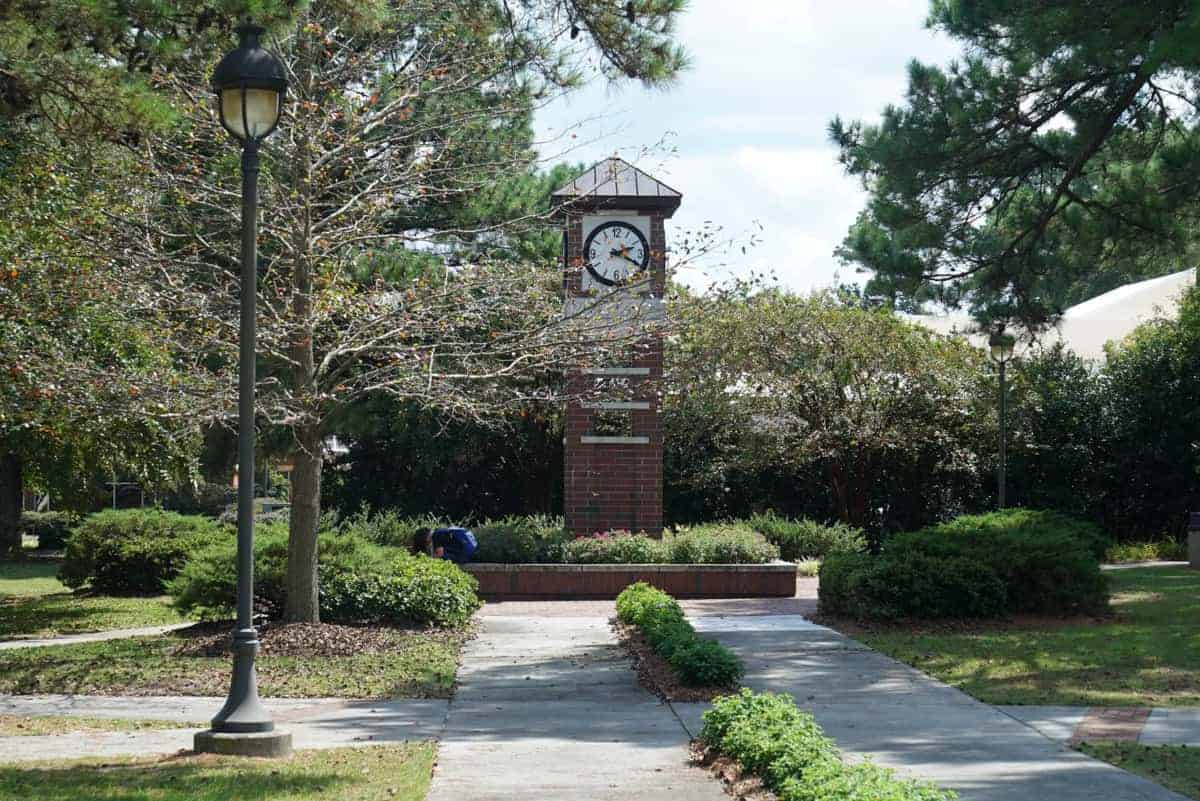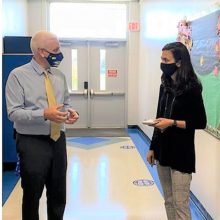North Carolina’s community colleges served 735,000 students during the 2014-15 academic year, or 1 in 9 North Carolina citizens age 18 and older. The system’s 58 colleges make it the third largest community college system in the nation based on number of colleges.
During the People’s Session, three core policy areas related to North Carolina’s community colleges came up time and time again: faculty pay, funding of the colleges, and residency determination.
Faculty pay
From the 2016-17 to the 2017-18 year, the average nine-month salary for full-time faculty at North Carolina community colleges increased 2%. The salary is now $50,293, which doesn’t include adjunct faculty or staff salaries.
According to this database by the Chronicle for Higher Education, the national average salary for a full-time instructor at a public two-year institution is almost $72,000. Average staff salaries at public two-year institutions vary greatly based on department, as do adjunct faculty salaries.

During the People’s Session, 86% of participants agreed that community college faculty and adjunct faculty should have their pay increased to the national average. However, there was less consensus on the topic of tenure, as only 69% agreed that community college faculty should be able to obtain tenure.
“It is imperative the legislature increases community college staff salaries. Colleges often fill two or more positions with one staff member, creating work overload, burnout, and job dissatisfaction, yet greatly underpay those employees. This leads to loss of experienced and knowledgeable staff who are difficult to replace.” — Union County

“What keeps me up at night when I think about education in NC is the disparity in faculty starting/minimum salaries compared to faculty salaries at universities across our state. I have a Ph.D. and chose to work at a community college because I enjoy teaching more than I do research. But my salary is at least half as much as I would have earned at a university.” — Davidson County
Community college funding
North Carolina’s 58 community colleges receive the majority of their funding from state taxes. However, this funding varies a lot depending on the college’s student enrollment and the types of courses offered. More than 80% of a community college’s funding is based on enrollment. Additional funding from counties, grants, and other donations also support the colleges.
We have a video with Jennifer Haywood, executive vice president for the North Carolina Community College system, that further breaks down how community colleges get their funding here.
Seventy percent of People’s Session participants agreed funding should be increased to at least the same level as the UNC System.

There was more consensus among those polled for the state providing start-up funding to community colleges for new programs they want to create, with 83% agreeing.

You can read more about community college funding and enrollment here.
Residency determination
In-state tuition for one year of community college, on average, is about $2,400 in North Carolina, while out-of-state tuition is $8,500 — or roughly 3.5 times more expensive. In order to protect the subsidized rate, the state legislature enacted laws to determine whether a student is a North Carolina resident. In 2017, a new, centralized electronic system went into effect called the Residency Determination Service (RDS) aimed at making the determination process more efficient and consistent.
The system is used for all institutions of higher learning in North Carolina, including the UNC System. And while RDS seems largely to have worked as planned at the four-year universities, community colleges say it lacks the personalization and humanity necessary to address the individual and unique circumstances of their students and has become a barrier to people pursuing continuing education.
On the issue of residency determination, only 65% of People’s Session participants agreed there should be fewer forms for students to determine the residency status.

“At the community college system, our students are often high-touch students that don’t understand why they are being asked so many questions to attend. We don’t have the resources to guide every student through the system, and there are definitely students that are getting discouraged and not completing the process because of the amount of information required or their lack of understanding. It is especially discouraging for students that have lived in NC all of their lives to be incorrectly classified and not understand what they need to do to be classified as in-state.” — Wake County
Sixty-eight percent of participants agreed that every student who graduates from a North Carolina high school should be granted residency status for tuition. This statement reflects a change to the residency system process proposed by Senate Bill 295.

SB 295, entitled NC HS Graduation as Evidence of Residency, allows graduating from a North Carolina high school to rebut the presumption that the student’s residence is the same as their parents during the residency determination process. However, students must still have established legal residence in North Carolina and maintained that residence for 12 months prior to being classified as a resident for in-state tuition purposes. This bill is scheduled to appear in front of the full Senate on April 29.
At Tri-County Community College, residency complications take a different form: Students from border counties in Georgia and Tennessee would be charged out-of-state tuition to attend Tri-County. However, the same is not true for students in North Carolina. Just across the border, North Georgia Technical College offers in-state tuition to North Carolina residents from Cherokee, Clay, and Macon counties, two of the three counties in Tri-County’s service area. North Carolina students are driving across the state border to attend community college, but not vice versa.
House Bill 8, titled “In-State Tuition Pilot Program,” would allow Tri-County to offer in-state tuition for students from four counties in Georgia. After passing the Senate, HB 8 was referred to the Senate rules committee.
The People’s verdict
Participants in the People’s Session strongly agreed with policies to increase funding for community colleges and their faculty, though views differed more on the issue of residency determination and tenure for faculty.
Interested in North Carolina’s community colleges? We have a newsletter for that. Subscribe below to receive our weekly Awake58 email that covers what is happening in the legislature and shows you some of the highlights from our hundreds of articles on community colleges across the state.
For a closer look at what people said about standardized testing and other key education issues, read our full People’s Session report.
To join weekly conversations with Reach NC Voices about policy issues facing North Carolina, leave your contact information below.




